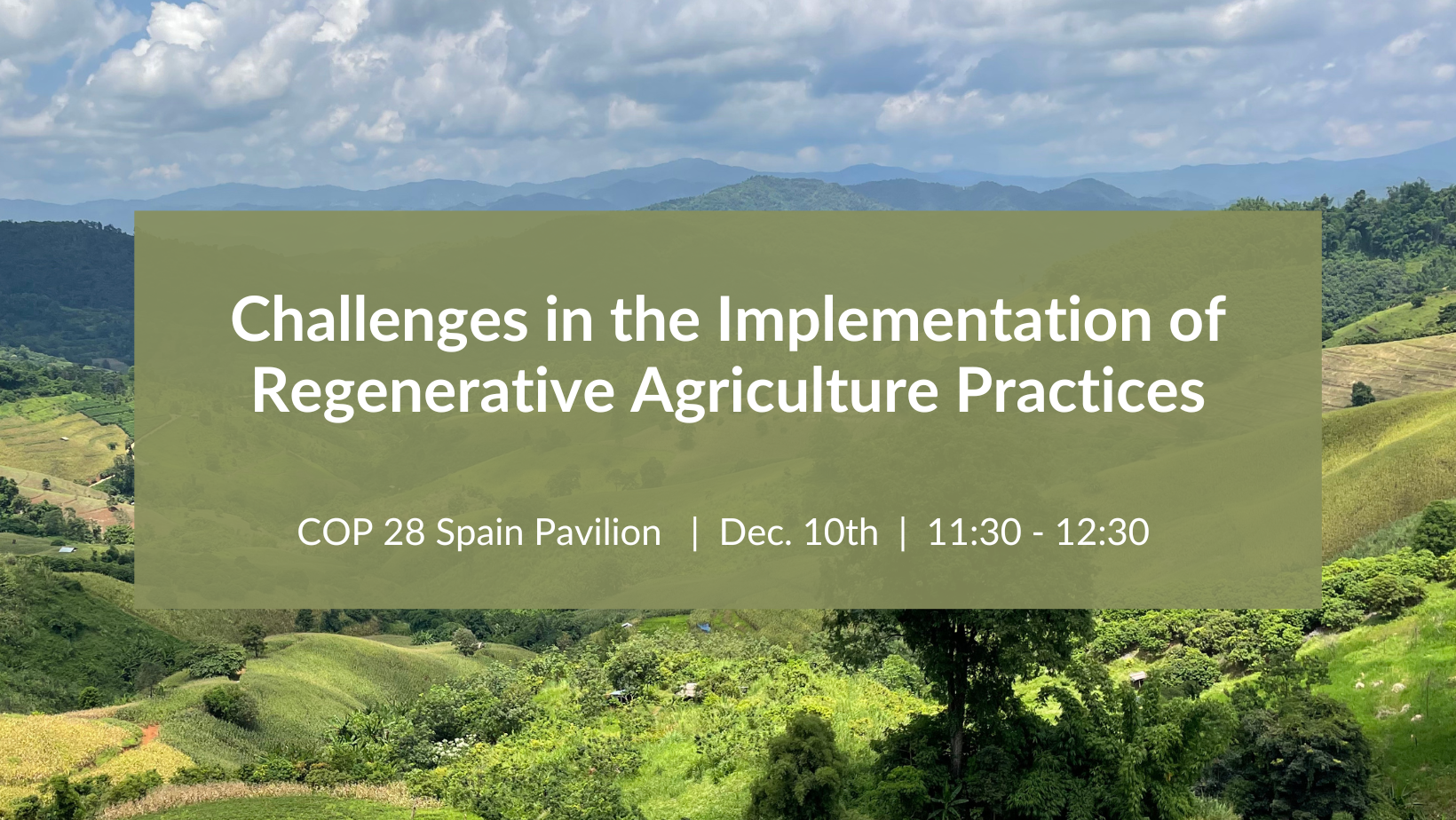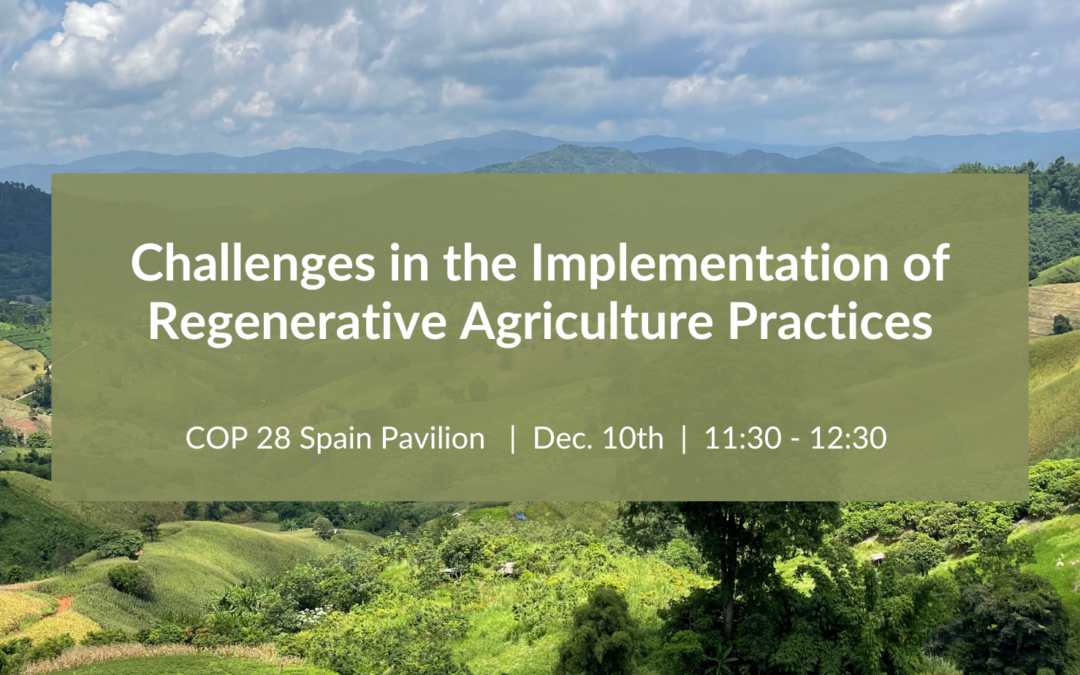
Challenges in the Implementation of Regenerative Agriculture Practices
This event highlights a critical agricultural shift that aims to revolutionize food production while enhancing sustainability and ecological health. This event addresses the hurdles faced in adopting regenerative agricultural practices in an era marked by climate change and the need for more sustainable farming.
The event underscores the significance of transitioning from conventional farming methods to regenerative practices prioritizing soil health, biodiversity, and carbon sequestration. It provides a platform for farmers, researchers, policymakers, and environmentalists to explore the complexities and obstacles inherent in this transition.
Through in-depth discussions, this gathering offers a comprehensive overview of the challenges faced in scaling up regenerative agriculture, including access to resources, market demand, and education. It aims to equip participants with a deeper understanding of the hurdles and potential solutions, fostering a roadmap for broader adoption of regenerative agriculture practices. Challenges in the Implementation of Regenerative Agriculture Practices is a pivotal moment in the ongoing effort to transform how we cultivate the land and manage our natural resources.
Event Goals:
- Discuss challenges related to access to land, financial resources, and training needed to implement regenerative practices.
- Examine how government policies and incentives can encourage the adoption of sustainable agricultural practices.
- Present effective methods for measuring the impact of regenerative practices on soil health, biodiversity and climate change mitigation.
Speakers:
Carlo Fadda, Director of Biodiversity for Food and Agriculture, and head of CGIAR Nature Positive Solutions
Carlo Fadda guides the research area in Biodiversity for Food and Agriculture. He oversees a research area with over 100 people, including consultants, support staff and over 45 scientists. His team focuses on four major research areas: agrobiodiversity in production systems, conservation, characterization, and genomics of bananas, forest genetic diversity, and biodiversity-related policy. Carlo is also leading the global initiative called Nature Positive Solutions, which is part of CGIAR. This trans-disciplinary project promotes sustainable agriculture and nature-positive solutions in five countries: Kenya, Burkina Faso, India, Vietnam, and Colombia. It aims to ensure food and nutrition security and improve livelihood within planetary boundaries by promoting biodiversity.
Elena Pita, Director at Biodiversity Foundation, Spanish Ministry for Ecological Transition and Demographic Challenge
Elena Pita is the director of the Biodiversity Foundation, a public entity of the Ministry for the Ecological Transition and the Demographic Challenge of the Government of Spain. Previously, she has been a UN Environment official in Panama’s Regional Office for Latin America and the Caribbean. She has also worked for the European Union as a consultant, in the EU Delegation in Mauritania, for the Spanish Agency for International Development Cooperation, for the Spanish Office for Climate Change, and for the AEPO consultancy in its Libreville office (Gabon). She is an agricultural engineer from the Polytechnic University of Madrid and a Master of Sciences from the Mediterranean Agronomic Institute of Montpellier (IAMM).
Daniel Zimmer, Sustainable Land Use Lead at Climate-KIC
Daniel Zimmer is the Sustainable Land Use Lead at Climate-KIC. In this position, he developed a portfolio of innovation projects to accelerate land use and the food supply chain’s systemic transformation in response to climate change in mitigation and adaptation areas. He gained an in-depth and broad experience of land management issues and potential solutions. Previously, he was the Director of the World Water Council, where he developed global expertise in water-related matters from research and engineering to finance and geopolitics. He connected science, policy and water experts in multi-stakeholder processes aiming to address the current water crisis and implemented high-level panels and political processes on adaptation.
Sara J. Scherr, President and CEO EcoAgriculture Partners, Chair 1000 Landscapes for 1 Billion People
Dr. Sara J. Scherr is an experienced agricultural and resource economist. She is the founder and president of the non-profit EcoAgriculture Partners, which promotes locally-led transformations of agricultural landscapes for food security, rural livelihoods, and ecosystem services. She has supported landscape partnerships in Africa, Latin America, Asia and the U.S. and advised landscape programs worldwide. In 2011, she co-founded ‘Landscapes for People, Food and Nature’; in 2019, she launched and now chairs the global initiative ‘1000 Landscapes for 1 Billion People’ to accelerate landscape regeneration worldwide. She previously served as Director of Ecosystem Services at the non-profit Forest Trends and was a senior researcher at IFPRI, Univ. of Maryland, and ICRAF.
Fabrice Salamanca, VP Global Public Affairs at Danone
Tara Shyam, Director at Regen10
Tara Shyam is a specialist in multistakeholder food systems partnerships, with diverse expertise spanning climate-smart agriculture, nutrition, school meals, and food loss & waste, with significant experience in the Global and Asia-Pacific arenas. Tara is adept at shared-value stakeholder engagement across government, business, non-profit/non-governmental organizations, multilateral agencies, civil society, and academia, ranging from high-level leadership to on-the-ground operations. She has worked for the World Food Programme, CGIAR Institutes, the Global Nutrition Report, The Global FoodBanking Network, and UNICEF, among others.
MarÍa Dolores Valderraín, Regenerative Mulching, Winners “Generación Clima”
Mariola Valderraín Navarro is a university student from Madrid. She is pursuing three degrees: Law, Political Science, and Criminology at the Universidad Complutense of Madrid and UNED. During her studies, she has represented her peers in various bodies and delegations or departments of Political Science and Administration. Moreover, she is involved in the first youth lobby, “Talent for the Future,” where she fights for the visibility and participation of youth in politics. Within this organization, she investigates and co-creates the report on GEI in 2023 in Spain, fast fashion, and youth consumption. She is confident in addressing climate change, so she’s here to represent her team that has created a project named Mulching Regenerative.
